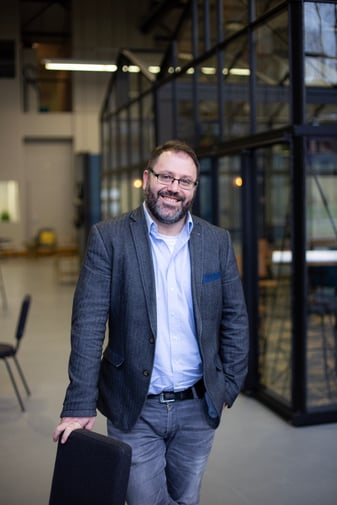-2.png)


Gareth Thomas was born in South Africa in a family of mathematicians. Because of the apartheid, they moved to The Netherlands when he was a kid, and continued moving countries every few years. Singapore, Hong Kong, Macau, Portugal, Scotland. "I think the exposure to diverse cultures has been the greatest gift my parents could ever give me." Now, back in Eindhoven, The Netherlands, Gareth is running a startup called VersionBay, that empowers people by leveraging state-of-the-art software stacks.
The coming months we will introduce female and male role models who act upon increasing diversity in the tech industry. By telling their personal and career stories, we can inspire and learn from each other.
Engineering is not ‘a male thing’
“People typically see engineering as a male thing, and HR has to put process and checks in place. I think that often the question is not that much about male-female diversity, but more about diversity of personalities.” The company Gareth previously worked at, MathWorks, the HR was hired to map out personality types, for example, DISC assessments, to realize which talents and perspectives the company was missing to be more productive. The assessment helped the company identify whether there is a need for more creative, decisive, or analytical people.
It helped to get balanced teams and help managers to figure out whom to hire, how to communicate with different types of team players. Based on his experience, Gareth points out a trend: “The more empowered the HR department of the company is, the more these questions of increasing diversity in terms of gender, race, religion, beliefs would come up on a strategic level.” But the precondition to that is, first, a change of mindset: “Managers need to step away from hiring a similar profile as themselves. Then, on the long-term, their awareness of the diversity within the teams will make their companies thrive."
He draws an analogy of how engineers are great in building things, for example, a self-driving car, but often overlooking the legal and social consequences of their creations. Engineers typically think: ‘Can we do it? Yes or no’, and sometimes forget about ‘if there is an accident, who’s the one to blame? Even worse than that - it’s a social impact which raises questions like: ‘If there is a self-driving car, does it mean a child can use it?’ People can create beautiful things but they need to look at them from different perspectives.
Daddy-day and mommy-day
Discussing diversity in different cultures, Gareth says the diversity in the Netherlands is better than in many other countries. Partly, due to the independency that Dutch women have, and their pride to be independent. “If you become a mom, it is okay to work part-time. In many countries, this is not the case. The concept of a mommy-day and a daddy-day doesn’t exist.” He thinks that Dutch government offers an infrastructure suggesting that it’s important for people to have careers, but if they choose to have a part-time career and take care of the family – the government will enable that. And it applies both to moms and dads. Also, he recognizes that The Netherlands facilitates diversity with its laws for the internationals. Highly skilled migrants are entitled to the 30% tax allowance and are not obliged to speak Dutch to work in the country. Portugal and Italy are different.
Diversity happens from within
Gareth thinks that diversity in cultures and companies will thrive if more people think that diversity happens from within. Discussing the injustices in gender representation in the workplace, Gareth strongly agrees that things like gender differences in salaries are unacceptable. But he also believes that people can be examples for others, and play an active role. “Results will come because people are passionate about and fight for something, versus waiting for a system to change.” He recalls a beautiful example from his childhood:
“When I was a kid, studying in Macau, half of the class was Portuguese, the other half was Chinese, and they would hang out in two separate groups. I didn’t know any of the languages but thought that I won’t sit quietly in the corner, and instead, I came up and started talking English with both groups. I wasn’t quite sure what I was doing but I proactively tried to change things, and because of that the class started talking the same language and became friendlier, and the teachers thought: why didn’t we see this before?“

Gareth also tries to introduce changes in the male-dominated work environment in the tech sector. He purposely puts himself in situations where he is the only male in the room, to remind himself what it feels like for women in the sector.
In his previous company, he joined marketing meetings with only women and recommends this practice for managers to widen their perspective.
Diversity is about passion and empowerment
For Gareth, diversity means empowering people to be successful independent of gender, race, belief, or economic status. Empowering can take different shapes and forms. “For example, by acknowledging that your team is unbalanced, or telling another team about the results you reached because of increasing diversity in your team. Those discussions must happen on a much regular basis inside companies.” Gareth believes, if you are a manager, it’s a must to empower others and give a platform for those with a passion.
For young people aspiring their careers, he encourages to articulate and share their passions. “I almost feel it is an obligation to share how cool it is to be a programmer!” He adds that having role models in a young age is stimulating, thus encourages female programmers to visit schools and raise awareness that it is okay for girls to follow this profession. Talking about younger generations, he thinks that teachers have a big influence on the career decision, and that teachers should be paid more: “I do think the diversity problem has to be tackled younger, and one of the ways to do that is by investing in teachers."
Learn more about the Female Tech Heroes movement and join us to create more diversity!